Jeb’s Bushian Speech
Jeb Bush's highly anticipated speech on foreign policy reminded me of the joke in which two senior citizens are complaining about a restaurant. "Terrible food at that place," says one. "Yes," says the other, "and such small portions!"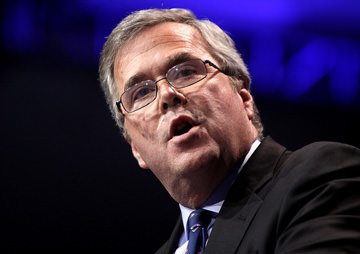

Jeb Bush’s highly anticipated speech on foreign policy reminded me of the joke in which two senior citizens are complaining about a restaurant. “Terrible food at that place,” says one. “Yes,” says the other, “and such small portions!”
Bush’s speech, which he gave Wednesday in Chicago, consisted of empty platitudes doled out in tight rations. Anyone who expected more from perhaps the leading establishment contender for the Republican presidential nomination had to be disappointed.
Set aside, for the moment, the fact that Bush’s rushed, fumbling delivery would have made even the grandest ideas sound small. Look past the fact that he proved his father’s and brother’s equal in creatively mangling the English language — saying, for example, that immigration should be a “catalytic converter” for economic growth.
Strip all that away, and you’re left with nostrums about how America must be strong and engaged and feared and respected — all of which is pretty much inevitable for the world’s pre-eminent economic and military power, no matter who occupies the White House. There were precious few examples of what, precisely, Bush would do differently from what President Obama is already doing.
Given that the previous presidents named Bush have gone two-for-two in launching major Iraq wars, one obvious question is whether Jeb Bush would make it three-for-three. He did not provide a clear answer.
“I’m my own man,” Bush said, “and my views are shaped by my own thinking and my own experiences.” This would sound a lot more convincing if it were not the case that 19 of his 21 foreign policy advisers previously worked for his brother George W. Bush, his father George H.W. Bush, or both. Among those achieving the Bush Trifecta are Paul Wolfowitz, one of the architects of the 2003 invasion of Iraq.
Jeb Bush acknowledged that “there were mistakes made in Iraq, for sure,” but praised his brother’s troop surge as “one of the most heroic acts of courage politically that any president’s done.” That is, of course, a ridiculous overstatement, but let’s cut him a bit of slack; he does have to sit around the Thanksgiving table with the guy.
Bush said that in fighting the Islamic State — the bloodthirsty jihadist militants who are attempting to establish a “caliphate” in parts of Iraq and Syria — his strategy would be “taking them out.” How this differs from Obama’s policy, which is to “degrade and ultimately destroy” the Islamic State, remains a mystery.
Bush did, at one point, overestimate the jihadist militia’s strength by a factor of ten, saying there were 200,000 fighters when he meant 20,000. But this mistake came when he was hurtling through his prepared speech in an apparent attempt to reach the question-and-answer part of the presentation, where clearly he was more comfortable.
Perhaps the most definitive position Bush took was a call for increased defense spending. But he did not attempt to specify what the additional money would buy, except to say the United States needs to “inspire fear in our enemies.” Current U.S. military spending, it should be noted, is greater than that of the next dozen countries combined.
If I were a fiscal conservative, I’d begin to suspect that Jeb Bush is as much of a big-government Republican as his big brother. He wants to spend more on the Pentagon, invest in infrastructure and education, spur the economy to 4 percent annual growth — if I didn’t know better, I’d say it all sounds almost Keynesian. Oh yes, he says he also wants to reform entitlement programs and balance the budget. Please tell me how all of this adds up.
After listening to the speech, it was hard to escape the feeling that Bush doesn’t really have a distinctive foreign policy vision — or that if he does have one, he’s not prepared to share it. He said his ideas might be summed up as “Liberty Diplomacy.” Is this the same as his brother’s “Freedom Agenda”? Is he signaling a preference for talk over action? Or did his advisers just think he needed a catchphrase?
Overall, it was not a terribly impressive performance. In his time as Florida governor, Bush showed himself to be smart and wonkish about domestic issues. If he has any fresh, original ideas about the international sphere, he succeeded in keeping them to himself.
The problem with this approach is that it invites voters to fill in the blanks — and to begin with a surname that does not augur well.
Eugene Robinson’s e-mail address is eugenerobinson(at)washpost.com.
© 2015, Washington Post Writers Group
Independent journalism is under threat and overshadowed by heavily funded mainstream media.
You can help level the playing field. Become a member.
Your tax-deductible contribution keeps us digging beneath the headlines to give you thought-provoking, investigative reporting and analysis that unearths what's really happening- without compromise.
Give today to support our courageous, independent journalists.
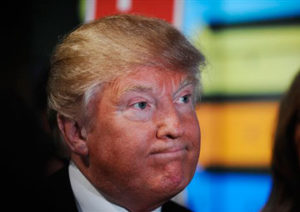
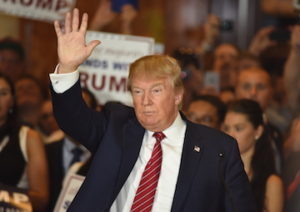
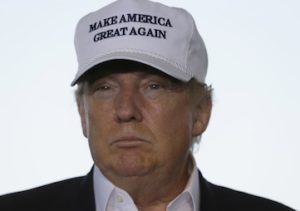
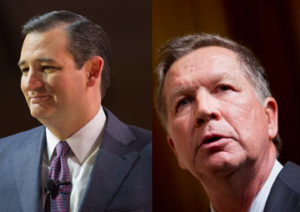
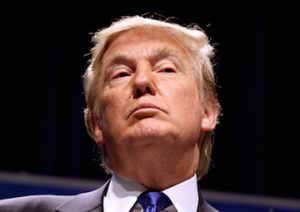
You need to be a supporter to comment.
There are currently no responses to this article.
Be the first to respond.